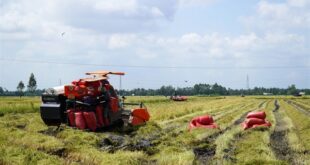
|
| Deputy Prime Minister Trần Hồng Hà chaired a meeting with the Central Inter-Ministerial Steering Committee on Food Safety in Hà Nội yesterday. VNA/VNS Photo Vân Điệp |
HÀ NỘI – Food safety management must be ensured at all levels, along with promoting the roles and responsibilities of grassroots governments and knowledgeable consumers, Deputy Prime Minister Trần Hồng Hà said yesterday.
In the meeting with the Central Inter-Ministerial Steering Committee on Food Safety in Hà Nội yesterday, the deputy PM requested that in the coming time, the committee continuously review and summarise the implementation of the 2010 Food Safety Law, strategies, planning, plans, and action programmes on food safety, update modern and unified food safety management practices, methods and models from central to grassroots levels, promote decentralisation, and strengthen resources for food safety implementation.
Hà emphasised the need to innovate diverse and regular communication methods and forms, thereby changing the awareness of all levels and sectors, especially grassroots and people, about food safety and having peak periods and serious responses to food safety violations.
Each ministry and sector should strengthen food safety management throughout the value chain, promote the spirit of self-responsibility, focus on inspecting and examining areas that have a significant impact on human health, and proactively develop standards and regulations to harmonise with international standards and regulations, Hà said.
“Ministries and branches have to promote the application of information technology further, create favourable conditions for businesses and people to register product quality announcement, as well as receive feedback and supervision from socio-political organisations, associations and people regarding compliance with food safety regulations,” said the Deputy Prime Minister.
At the meeting, participants proposed to overcome the unclear assignment of responsibilities in food safety management at localities, especially at the commune and ward levels, to strengthen inspection and handling of food safety violations, and to immediately build a database of administrative violation records as a basis for criminal prosecution in cases of repeat violations.
Some delegates said that the Central Inter-Ministerial Steering Committee on Food Safety is organised from the central level down to the district level. Still, in communes and wards, there are only part-time staff.
Food safety inspection activities must be undertaken in such a way as to avoid disturbing businesses, establishments and people.
Delegates recommended the need to strongly apply information technology and build a map of food safety nationwide with the direct participation of people combined with a database on handling food safety violations.
In 2023, the system of legal documents on food safety continued to be completed, meeting State management requirements. Inspection and examining work was implemented, focusing on specific cases.
The health sector inspected more than 382,000 establishments and found 34,500 violating establishments, of which more than 12,000 establishments were fined about VNĐ44.4 billion (US$1.9 million).
The agriculture sector inspected more than 19,300 establishments producing and trading agricultural materials and agricultural, forestry and fishery products, and administrative sanctions on more than 1,600 establishments were worth more than VNĐ14.4 billion ($586,606).
The industry and trade sector inspected more than 8,300 cases, handled more than 6,770 violations and levied fines of VNĐ36.3 billion ($1.48 million), and confiscated goods valued at VNĐ31.6 billion ($1.3 million).
Meanwhile, the Environmental Police Force detected and handled more than 7,100 cases of violations and collected a total fine of more than VNĐ31 billion ($1.26 million).
Information, education and communication work were strongly promoted and continuously increased in quantity and diversified forms.
The awareness of law enforcement among production, processing and business establishments was increasing. Sales of poor quality goods, expired goods and goods of unknown origin decreased. Food poisoning prevention and control was implemented drastically and synchronously. Nationwide, 125 cases of food poisoning were recorded, poisoning more than 2,100 people and causing 28 deaths. Notably, poisoning caused by clostridium botulinum (a very rare toxin) occurred.
Along with the achieved results, there were still some limitations that needed solving.
After 13 years of implementation, many provisions of the Food Safety Law are no longer consistent with practice. Decree 15/2018/ND-CP still has many shortcomings regarding regulations on exported food control, registration of declarations, and food safety conditions at markets and craft villages. The management, supervision, inspection and handling of food safety violations on the internet and e-commerce environment remains difficult.
Phạm Khánh Phong Lan, director of the HCM City Department of Food Safety, said that the legal framework for food safety management is complete, but there is still a lack of models and organisations carrying out effective, practical implementation.
“I suggested that the risk monitoring and food testing sampling rate must increase compared to last year. The results must be better and violating samples must decrease,” Lan said. VNS
- Reduce Hair Loss with PURA D’OR Gold Label Shampoo
- Castor Oil Has Made a “Huge” Difference With Hair and Brow Growth
- Excessive hair loss in men: Signs of illness that cannot be subjective
- Dịch Vụ SEO Website ở Los Angeles, CA: đưa trang web doanh nghiệp bạn lên top Google
- Nails Salon Sierra Madre
 VnExpress News The News Gateway of Vietnam
VnExpress News The News Gateway of Vietnam





